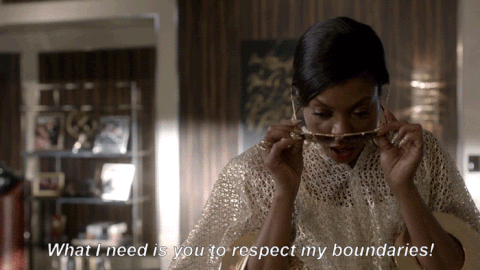the blog
welcome to tate psychotherapy
Cozy up and read up. In our blog posts we share actionable steps and advice to help you improve your mental health.
We’ll talk all things anxiety, depression, relationships and everything inbetween.
10 Tips for Navigating Difficult Conversations Over the Holidays
December 5, 2024

While Hallmark movies paint the holidays as a time of joy, celebration, and connection, that’s not always the reality for many of us. Often family gatherings this time of year come with their fair share of tension, be it political debates, unsolicited advice or ongoing family conflicts resurfacing. You want to spend time with your family this holiday season, but you aren’t sure how to best handle those difficult conversations that arise. Here we’ll explore ten practical strategies to help you confidently navigate these uncomfortable discussions and protect your peace.
1. Understand Your Triggers
Before you step foot into a holiday gathering, take some time to reflect on what tends to challenge you in these settings. Are there specific people, topics, or behaviors that bring up strong emotions? Maybe it’s Aunt Susan commenting on your weight, your mom asking when you are going to move up in your career or it’s just being in the same room as your cousin.
Triggers aren’t inherently bad—they’re simply cues that something matters to you. Recognizing them helps you respond thoughtfully rather than reacting in the heat of the moment.
Reflection Exercise
- Write down potential triggers you might encounter, such as certain relatives or topics.
- Consider how these triggers make you feel and why.
This awareness helps you prepare strategies to stay grounded. When you have more of an understanding of your emotions and why something triggers you in a certain way, you can better prepare ahead of time to regulate your emotions and respond during these difficult conversations.
2. Set Intentions for the Gathering
Knowing your goals for the holiday can help you stay focused when conversations take a challenging turn. Do you want to deepen connections with certain family members? Maintain peace? Simply get through the event with minimal stress? Be honest about how you’re feeling?
There is no right or wrong answer. Deciding how you want to handle these interactions before the gathering can help you brainstorm what to say that will align with your goals for family time.
Tip: Phrase your intentions positively. For example:
- Instead of “I don’t want to argue,” try “I want to connect with my family by sharing stories and laughter.”
When your goals are rooted in what you want to create, rather than what you want to avoid, it’s easier to stay calm and centered—even if tensions rise.
3. Create and Communicate Boundaries

Boundaries are essential for maintaining your emotional well-being during holiday gatherings. They’re not about shutting people out, but about creating conditions for healthy interactions and protecting yourself.
Boundaries can be internal (deciding not to engage in certain topics) or external (politely asking someone to stop a specific behavior). The key is to communicate them respectfully and clearly.
Examples of Assertive Boundary Phrases
- “I’d rather not discuss politics today. Can we focus on catching up instead?”
- “I know you’re passionate about this, but I feel uncomfortable when the conversation gets heated.”
- “I need to step away for a moment to reset. Let’s continue this later.”
- “I’m not up for that today.”
- “Please don’t comment on my body.”
- “That’s not up for debate with me.”
4. Use “I” Statements to Express Yourself Clearly
When conflict starts, it’s easy to jump to accusations: “You always do this!” or “You’re so unreasonable!” This can make others feel defensive and derail the conversation.
“I” statements allow you to express your feelings and needs without placing blame, fostering understanding rather than conflict.
How to Use “I” Statements
- Start with your feeling: “I feel…”
- Identify the issue: “…when the conversation shifts to criticism about my parenting.”
- Make a request: “Could we keep the focus on celebrating today?”
Instead of “You’re ruining dinner with this argument,” try “I feel overwhelmed when conversations get heated. Can we table this for later?”
5. Practice Active Listening
One of the most powerful ways to defuse tension is to listen to truly understand the other person. When people feel heard and understood, they’re less likely to become defensive or argumentative.
How to Actively Listen
- Focus fully: Put your phone down, set aside distractions and give them your full attention.
- Reflect back: Paraphrase what the person is saying: “It sounds like you really care about this.”
- Validate feelings: Even if you disagree, acknowledge their emotions: “I can see why this feels important to you.”
6. Use Emotional Regulation Strategies
Holiday stress can trigger intense emotions, making it harder to navigate tough conversations. Emotional regulation—the ability to manage and healthily respond to emotions—is a critical skill for these moments.
Ways to Help Regulate During Difficult Conversations:
- Pause and breathe: Deep breaths signal your nervous system to calm down, helping you think more clearly. Try taking at least five slow deep breaths to help recenter yourself.
- Ground yourself: Use the 5-4-3-2-1 method: name five things you can see, four you can touch, three you can hear, two you can smell, and one you can taste. Grounding yourself can help calm you and bring you back to the present moment when your emotions become overwhelming.
- Take a break: Step outside, splash water on your face or stretch to release built-up tension.
Research has found that mindfulness techniques, like grounding exercises and breathwork, have a positive effect on emotional regulation.
7. Focus on Connection, Not Winning
It’s tempting to approach difficult conversations as debates to win, but this mindset often leads to defensiveness and disconnection. Instead, focus on fostering understanding and connection.
How to Shift the Tone
- Ask open-ended questions: “What makes this issue so important to you?”
- Approach with curiosity: “I hadn’t thought of it that way. Can you tell me what led you there?”
- Communicate that you hear them: “It sounds like this really matters to you because of [reason].”
Even if you disagree, validating the other person’s feelings can diffuse tension and create space for a more meaningful exchange.
8. Know When to Exit Difficult Conversations
Some conversations are not worth continuing. If a discussion feels unproductive, harmful, or too emotionally charged, it’s okay to step away.
Tips for Exiting Gracefully
- Redirect: “Let’s shift gears—what are your plans for the new year?”
- Excuse yourself: “I’m going to grab a drink and check on the kids. Be right back!”
- State your boundary: “I don’t think this is the time for this conversation.”
Exiting doesn’t mean you’re avoiding conflict—it means you’re choosing to protect your peace.
9. Choose Whether You Want to Engage

Not every comment or disagreement requires a response. Sometimes, the best way to make it through the holidays is to let go of smaller conflicts that don’t align with your goals for the gathering or to briefly address an issue before moving on.
For example, you might choose not to debate with an extended family member but feel it’s important to address a disrespectful comment they made about someone’s identity or life choices.
When you’re deciding how to engage, ask yourself:
- Does this need to be addressed right now?
- Will engaging likely lead to a productive or meaningful outcome?
- Can I let this go without compromising my values or boundaries?
- Is there a way for me to communicate that I didn’t like what was said without making it into a big conversation? (E.g. “I didn’t like that.” “I’m surprised you said that out loud.” “I’m not your target audience.” “That’s not okay with me.”)
10. Take Care of Yourself Before and After the Gathering
Navigating holiday conversations isn’t just about what happens in the moment. Preparing ahead of time and decompressing afterward can make the experience much smoother.
Pre-Gathering Self-Care Tips
- Get enough sleep the night before. Exhaustion can intensify your emotions and reactions.
- Practice relaxation techniques, like meditation or gentle movement, to enter the event with a calm mindset.
- Plan supportive routines or strategies such as calling a friend before the event to prepare or making sure you’re wearing clothes that won’t add to any frustration at the event.
Post-Gathering Decompression Tips
- Reflect on what went well and what you’d like to handle differently next time.
- Engage in activities that recharge you, like reading, exercising, or spending time in nature.
- Remind yourself that perfection isn’t the goal—showing up and doing your best is enough.
Holiday gatherings can be a complicated bundle of love, stress, connection, and boundaries all wrapped together. By understanding your triggers, setting boundaries, and prioritizing connections, you can navigate even the most difficult conversations with more confidence. Remember, you’re not striving for perfection—you’re striving for authenticity and care. Your emotional well-being is also a priority, so if a situation feels too overwhelming, it’s okay to step back, take a breather, or seek support from a trusted friend, family member, or therapist.
Want 1-on-1 Support? | New York Therapy
If you’re ready to build skills to handle those tricky conversations (or just need someone to vent to about Aunt Susan’s unsolicited advice), Tate Psychotherapy is here to help.
Therapy doesn’t have to be stiff or awkward. Together, we’ll work on strategies to protect your peace, strengthen your communication, and navigate the holidays. Let’s turn those “Oh no, not this again” moments into “I’ve got this” moments. Reach out today for a free consultation.
Sources Hill, C. L. M., & Updegraff, J. A. “Mindfulness and its relationship to emotional regulation.” Emotion, 2012. Accessed December 3, 2024.
Leave a Reply Cancel reply
Call 212-729-6034 or email admin@tatepsychotherapy.com - 1133 Broadway, Suite 645, New York, NY 10010
© 2025 Tate Psychotherapy LCSW PLLC || Web Design : Breeze Design Web Studio
follow along @tatepsychotherapy
navigate
SERVICES
about
blog
contact
Florida Department of Health
Privacy Policy
© 2025 Tate Psychotherapy LCSW PLLC || Web Design : Breeze Design Web Studio
Call 212-729-6034 or email admin@tatepsychotherapy.com - 1133 Broadway, Suite 645, New York, NY 10010
Good Faith Estimate
FAQS
home
EMDR
Overview of services
perinatal mental health
Teen counseling
Men's mental Health
Couples Therapy
IFS Therapy
clinical supervision
follow along @tatepsychotherapy
navigate
Florida Department of Health
Privacy Policy
© 2025 Tate Psychotherapy LCSW PLLC || Web Design : Breeze Design Web Studio
Call 212-729-6034 or email admin@tatepsychotherapy.com - 1133 Broadway, Suite 645, New York, NY 10010
Good Faith Estimate
EMDR
Overview of services
perinatal mental health
Teen counseling
Men's mental Health
Couples Therapy
IFS Therapy
clinical supervision
Call 212-729-6034 or email admin@tatepsychotherapy.com - 1133 Broadway, Suite 645, New York, NY 10010
© 2025 Tate Psychotherapy LCSW PLLC || Web Design : Breeze Design Web Studio
follow along @tatepsychotherapy
navigate
SERVICES
about
blog
contact
Florida Department of Health
Privacy Policy
© 2025 Tate Psychotherapy LCSW PLLC || Web Design : Breeze Design Web Studio
Call 212-729-6034 or email admin@tatepsychotherapy.com - 1133 Broadway, Suite 645, New York, NY 10010
Good Faith Estimate
FAQS
home
EMDR
Overview of services
perinatal mental health
Teen counseling
Men's mental Health
Couples Therapy
IFS Therapy
clinical supervision
follow along @tatepsychotherapy
navigate
Florida Department of Health
Privacy Policy
© 2025 Tate Psychotherapy LCSW PLLC || Web Design : Breeze Design Web Studio
Call 212-729-6034 or email admin@tatepsychotherapy.com - 1133 Broadway, Suite 645, New York, NY 10010
Good Faith Estimate